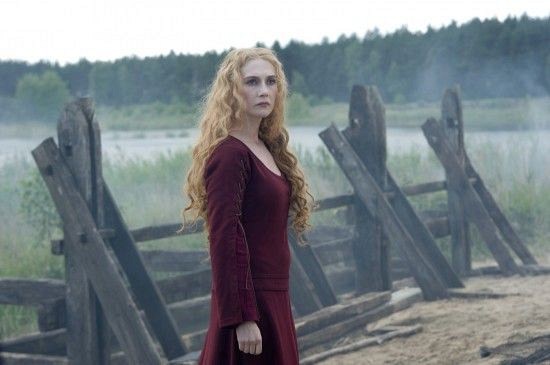A strength of Black Death is how it takes what's expected and adds a period-appropriate twist to it. This might be standard swords-and-armor production design, but the detail and the philosophy on display are transporting. Men in those iconic beaked masks stalk the streets of Osmund's town, and Ulric's rolling torture cart is well-stocked with the nefarious implements of the day. As with horror films of this kind, Ulric's caravan is warned off their destination, but here, the warning is delivered by self-flagellating fanatics wading through a murky creek. Death is everywhere, and the characters, with the exception of the barely-hopeful Osmund, are appropriately fatalistic in all things. Downtime conversation appears friendly enough on its surface until getting-to-know-you talk is replaced by anecdotes about the time all the women in a village were burned at the stake, just to be safe. This road trip has its various personalities that Osmund gets to know, but each one belongs to a murderer and a sadist in the thrall of a distant, unseen holy man.
The journey aspect is one part of Black Death. Another is the cult aspect, a personal favorite of mine. Upon arriving in the healthy village, things are appropriately creepy, becoming moreso when the village chief Langiva (a perfectly cast Carice Van Houten) appears. Seductive and confident at a time when either trait could get her accused of a hanging offense, she immediately puts Ulric on edge, and he cannot help but assert his muscular piety on the village, putting himself and his crew in danger. This is the rare cult film where the cult's existence is not only legitimately called for, but they might actually be the good guys compared to the indiscriminate injustice of the dominant religion. Smith and writer Dario Poloni don't settle there in the village's depiction, making things more complicated while also deepening Langiva's character beyond simply being a charismatic leader.
Black Death is submerged in its time period, well-cast, and intriguingly written, but it does falter in places. The fight choreography is inelegant and poorly shot, with the impetus being how dirty Ulric's men fight and not on a clear understanding of who's where and what they are doing. Averill is never much more than a McGuffin, not given the time or energy to make the character anything other than an object for Osmund to chase after, and an otherwise strong ending is marred by an unnecessary voiceover that does not even fit with what happened during the film. These moments briefly break the world that Smith and his team has worked so hard to create. With the commitment of something like the years-later The Witch, Black Death could've surpassed its action and characterization issues. Even without measuring up to that new standard, Smith impresses with his adherence to an appropriately dark tone for this ugly milieu. B

 RSS Feed
RSS Feed